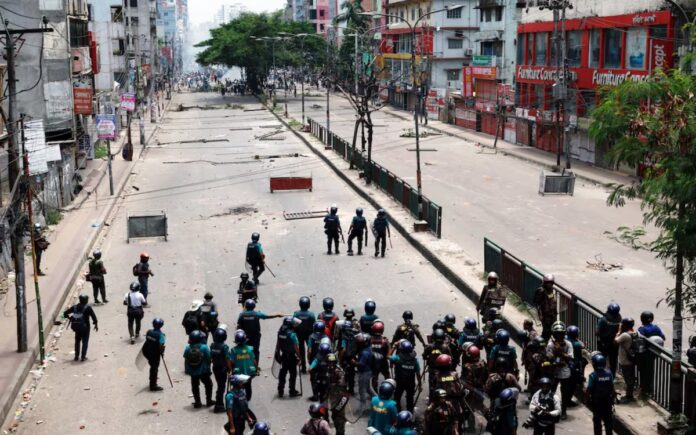Dhaka: On Saturday, Bangladesh deployed soldiers to patrol the quiet streets of Dhaka and set up roadblocks as part of a curfew aimed at controlling deadly student-led protests over government job quotas. The unrest has resulted in at least 110 deaths this week.
Since Thursday, internet and text messaging services have been suspended nationwide, isolating Bangladesh from global communication. Police have intensified their crackdown on protests, which have persisted despite a ban on public gatherings.
John Heidemann, chief scientist of the networking and cybersecurity division at USC Viterbi’s Information Sciences Institute, noted, “To take a country of nearly 170 million people off the Internet is a drastic step, one we haven’t seen the likes of since the Egyptian revolution of 2011.”
The violence has left thousands injured, with hospitals across the country reporting significant casualties. Dhaka Medical College Hospital alone received 27 bodies between 5 p.m. and 7 p.m. (1100-1200 GMT) on Friday.
For the past five days, police have used tear gas and sound grenades to disperse crowds as protesters clashed with security forces, hurling bricks and setting vehicles ablaze. These demonstrations, the largest since Prime Minister Sheikh Hasina’s re-election for a fourth term this year, are driven by frustration over high youth unemployment and contentious job quota policies.
The government’s response has included a national curfew and military deployment. The curfew was temporarily lifted for two hours on Saturday to allow people to purchase necessities and attend to other tasks. It will be in effect until 10 a.m. (0400 GMT) on Sunday, when authorities will evaluate the situation and decide on further actions. Soldiers have been inspecting identification cards at various checkpoints and setting up roadblocks and bunkers throughout Dhaka.
Also Read | UKMTO Reports Two Attacks Northwest of Yemen’s Mokha, Vessel Sustains Minor Damage
The protests erupted in response to the reinstatement of a controversial quota system for government jobs, which includes a 30% reservation for the families of independence fighters. Although Hasina’s government had abolished the system in 2018, a recent court ruling reinstated it. The Supreme Court has suspended the reinstatement for a month, pending a hearing on August 7.
In Narsingdi, a district of central Dhaka, protesters stormed a jail on Friday, freeing over 850 inmates and setting the facility on fire. Additional reports of arson emerged on Saturday from various parts of the country.
Also Read | Xi Jinping Calls for Urgent Rescue Operations After Highway Bridge Collapse in Shaanxi
Due to the ongoing unrest, Hasina has postponed her diplomatic visits to Spain and Brazil, according to Foreign Minister Hasan Mahmud’s office. Tarique Rahman, acting chairman of the Bangladesh Nationalist Party, reported that many opposition leaders, activists, and student protesters have been arrested, including Nahid Islam, a key student leader, who was detained early on Saturday.
India has reported that nearly 1,000 Indian students have returned home through land ports and flights since the violence began. International rights groups have condemned the internet blackout and the actions of the security forces. The European Union has expressed deep concern over the escalating violence and loss of life.



